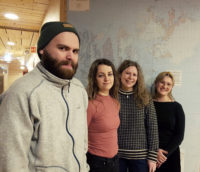Teaching projects and outstanding teaching get funding and award from Olav Thon Foundation
On January 10th, Olav Thon Foundation announced that UiB professor Ivar Rønnestad, professor Vigdis Vandvik (with colleagues) and UNIS associate professor Pernille B. Eidesen have gotten award and funding from the Foundation. Ivar Rønnestad received a national award for outstanding teaching, while Vigdis Vandvik and Pernille B. Eidesen received 1.5 million NOK and 1.35 million NOK, respectively, as research funding.
Congratulations!
The national awards for outstanding teaching
Professor Ivar Rønnestad, Department of Biological Sciences (BIO), University of Bergen
Ivar Rønnestad teaches physiology at various levels at BIO. He is a highly skilled and committed teacher who emphasizes continuous development of his teaching in line with modern and research-based teaching. Rønnestad has for many years had a strong international commitment – both in his research activity and in his teaching, and has succeeded particularly well in connecting research and education through various projects and activities. Ivar Rønnestad is a role model for many teachers at BIO, due to both a high scientific status and his collegial attitude and practice. He motivates colleagues to adopt new, modern and effective teaching methods. He has not only helped to change his own teaching practice, but also others, in a very positive direction.
Award: NOK 500.000,-
Read more about Ivar Rønnestad here.
Support for national student-active research projects
Project: From cradle to degree.
Responsible: Professor Vigdis Vandvik and others, Department of Biological Sciences, UiB.
It is an important goal and principle that the universities should conduct research-based education. Traditionally, this has been interpreted to mean that the students, through their education, will gain knowledge of and experience with the academic research front in the subject area they are studying. However, recent years’ focus on more student-active learning has clear consequences for how to understand and set up research-based education. The development of student-active teaching forms is in itself an expression that not only the content, but also the learning methods must be research-based, that is, based on what educational research shows gives the best learning. This project wants to build on both of these understandings of research-based education, but also add a third dimension, namely that the education must be research-based in the sense that the students get authentic experiences with research as practice, i.e. with the working methods and not least the forms of collaboration and collegial culture that characterize the research. This project wants to develop, test out, and document the effect of three learning programs in biology that actively use the opportunities that lie in the three understandings of research-based education. The three learning programs complement each other in that they meet the student at different levels, put different demands on the students, set up diverse forms of collaboration between students and between students and supervisors/mentors, and thus they also provide diverse learning outcomes. The project is supported by NOK 1.5 million over 3 years.
Project: Development of a high-arctic, interdisciplinary field laboratory for research and teaching.
Responsible: Associate Professor Pernille B. Eidesen, Department of Arctic Biology, UNIS.
Including students in field-based research activities requires more planning and resources than ordinary teaching. However, learning outcomes are completely unique. The Department of Arctic Biology (AB) at the University Centre in Svalbard (UNIS) wishes to develop a high-arctic, interdisciplinary field laboratory for research and teaching. One wants to establish measurement stations for obtaining a variety of parameters, biotic and abiotic, that are relevant when understanding both single components and relationships in an ecosystem. Such a field laboratory will create a cost-effective research synergy between employees, authentic research experiences for the students, and form the basis for initiating new projects with national and international partners who can contribute with further instrumentation and data capture. In this way, one can embrace the interaction in the ecosystem as a whole, and over time separate seasonal and mid-year variations from more lasting climate change. The project is supported with NOK 1.35 million over 3 years.
Read more about the project here




3 Responses
[…] Pernille B. Eidesen was awarded a reserach grant of 1.5 MNOK for a project which will support the development of a high-arctic, interdisciplinary field laboratory for research and teaching. One wants to establish measurement stations for obtaining a variety of parameters, biotic and abiotic, that are relevant when understanding both single components and relationships in an ecosystem. Read more here. […]
[…] field laboratory for research and teaching close to the university, which was recently awarded Thon funding. Such a field laboratory will create a cost-effective research synergy between employees, authentic […]
[…] Biology Department received a grant of 1,350,000 NOK from the Olav Thon Foundation to establish a high-Arctic, interdisciplinary field laboratory for research and teaching in Bjørndalen, also called BIG (Bjørndalen Integrated […]